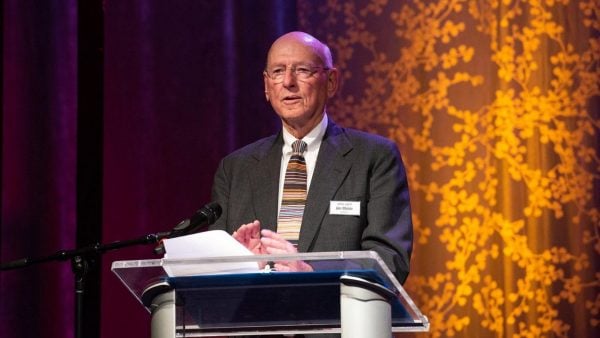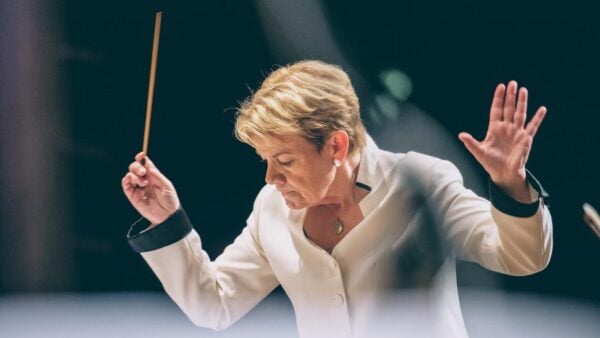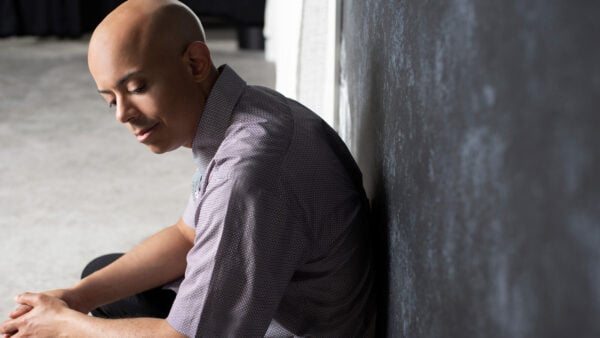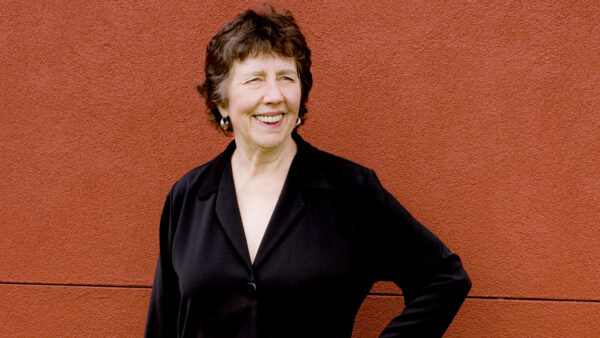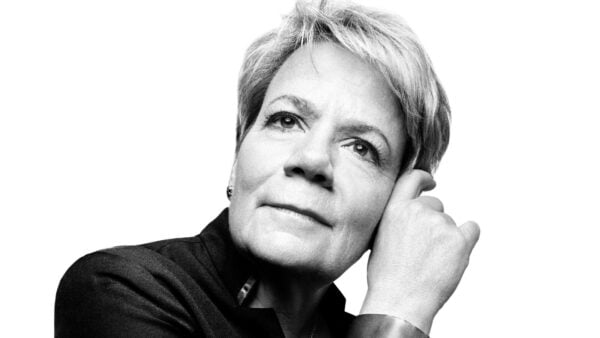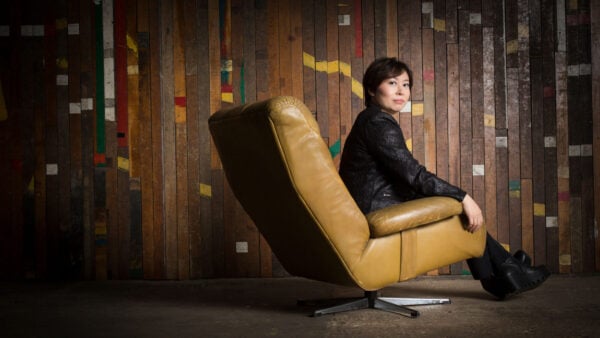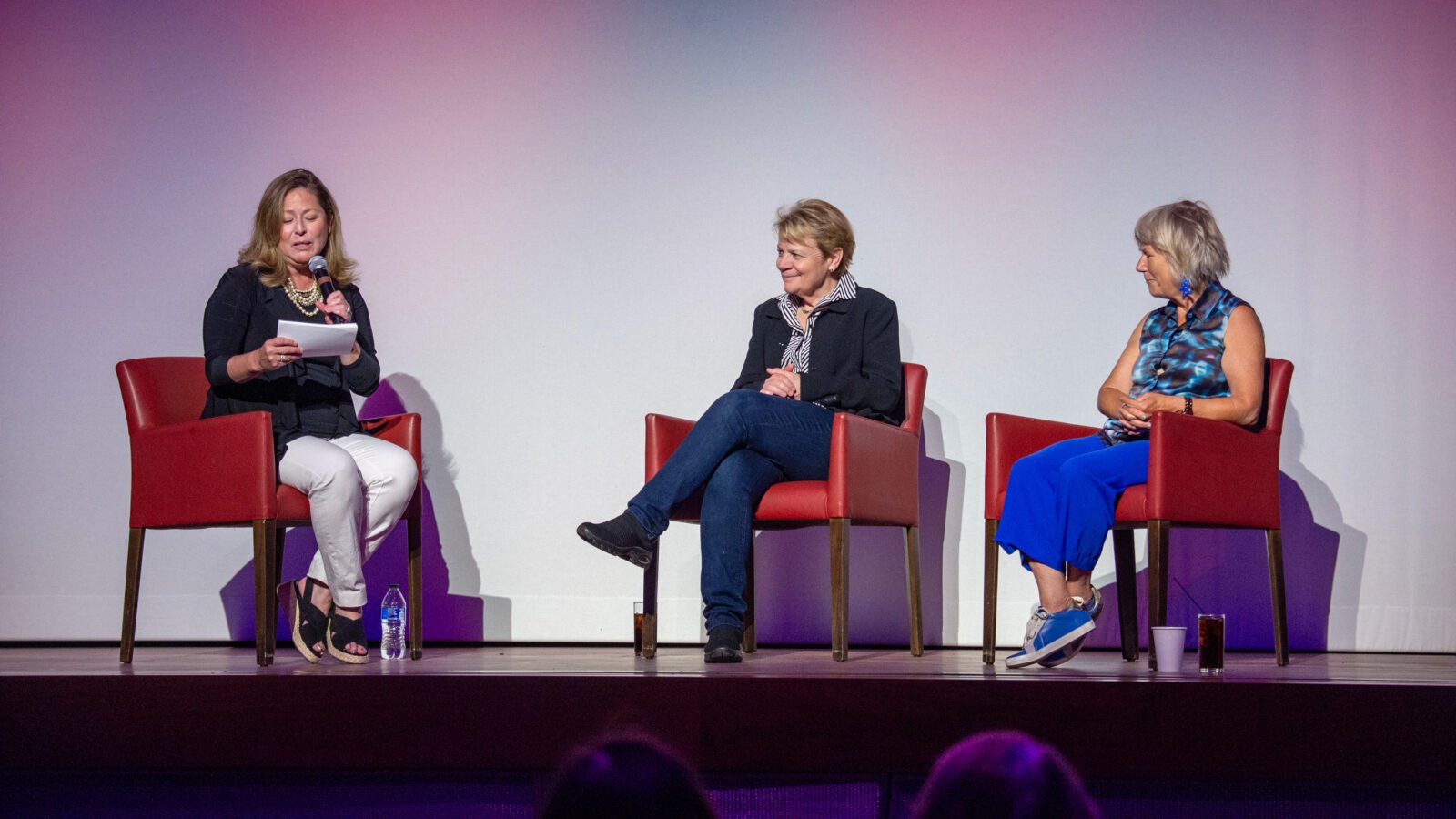
L-R: Sandra Cordova Micek, Marin Alsop, and Jude Kelly during the Leading with Purpose Panel at the Ravinia Music Box (Photo: Patrick Gipson)
Over the weekend, many of classical music’s vanguard leaders convened at the Ravinia Festival in Highland Park to sit in on a lively, far-reaching discussion between two luminaries and longtime friends: Marin Alsop and Jude Kelly. Alsop is the world’s most visible woman conductor, with a number of high-profile firsts and prestigious appointments to her name. Kelly, meanwhile, has held numerous distinguished positions in some of the UK’s finest theater companies and created the Women of the World Festival, all on the way to being awarded as a Commander of the Order of the British Empire.
Moderated by WFMT-WTTW President & CEO Sandra Cordova Micek, Alsop and Kelly appeared on the Leading with Purpose panel. The event was a highlight of Ravinia’s Breaking Barriers Festival, which debuted in 2022 to promote diversity in classical music and the arts.
Held from July 21 to July 23, this year’s festival focused on women in classical music, and featured programming and performances with appearances by Marin Alsop, conductor Valentina Peleggi, pianist-composer Gabriela Montero, and singer-songwriter Natalia Lafourcade. Also performing were several Taki Alsop Conducting Fellows and artists from the CSO and Ravinia Steans Music Institute Piano & Strings Program. Attendees also heard from arts administrators from D-Composed and Ravinia, business partners, as well as composers Clarice Assad, Augusta Read Thomas, Jessie Montgomery, Gabriela Ortiz, and more.
Framing the conversation, Micek invited the audience to look to these two artists for “inspiring ideas and hopes for the future as we all endeavor to break barriers.”
Finding Connection
Born to two musicians, Marin Alsop muses that her parents’ “only goal was to have a trio. So I was born and I had to be a pianist.” Though Alsop began playing the piano, she confesses that she “really hated” the instrument. It wasn’t until she was seven, when she was sent off to a summer camp, that Alsop first encountered the violin. “I don’t know whether it was getting away from my parents or what it was. But I loved the violin.” Joining an orchestra gave the young Alsop a sense of community, and as her interest in conducting grew, she was drawn to the idea that “it would be possible to be in charge of bringing people together.”
Kelly grew up in Liverpool in an immigrant family that was “modest, upwardly mobile… working class.” She was not raised in a conventional arts background, as “the aspiration in our family was to get a good education and it wasn’t assumed that arts was part of that.” What she was, though, was curious and empathic. “The most significant thing for me …. was noticing what I was told I couldn’t tell stories about, or which stories I wasn’t invited to be part of…” Ever since, she explains, she’s not satisfied “unless everybody’s in the room, unless everybody’s in the neighborhood, and unless everybody in the neighborhood has a story that’s given equal value.”
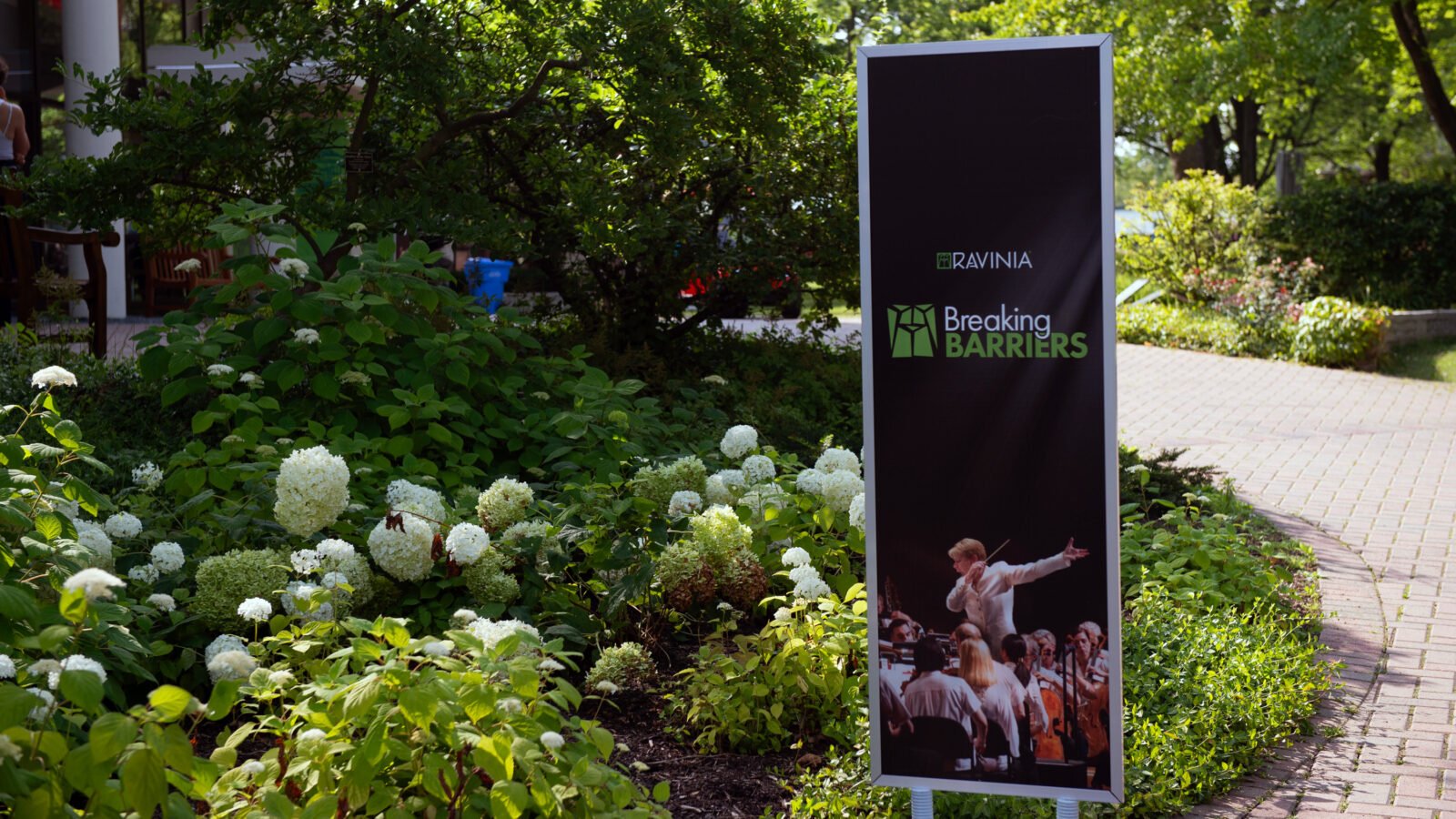
Photo: Patrick Gipson
Speaking on their similarities, Alsop concluded that “we’re both introverts with an intense desire to connect, which is quite tricky.”
Challenging Conventions
When Marin Alsop thinks “about a great maestro,” she admits, “I don’t come to mind.” This does not describe a lack of self-belief, but rather acknowledges that, as a woman, she is a minority in her field. When picturing a maestro, Alsop describes, “I have an archetypal image. He is tall, salt and pepper hair, and a scarf. An accent that’s not really identifiable, that maybe you can’t understand, but that sounds really good.”
Throughout her career, Alsop has overcome obstacles and restrictions because of her gender. She is a woman of many firsts: the first woman to lead a major American orchestra, the first woman to conduct the Last Night of the BBC Proms, the first woman to be named chief conductor of the Vienna Radio Symphony Orchestra, among many other such distinctions.
Jude Kelly, too, defies convention. She was the first woman to run London’s iconic Southbank Centre, the largest performing and visual arts center in Europe’s biggest. What’s more, she was also the first non-Oxbridge person to hold the role. “This is what social progress looks like… not because I am so amazing, but because [this girl from Liverpool had] the opportunity… [to reach] places where they could do the next thing.”
In her role at Southbank Centre, Kelly met Alsop, and remembers that “we just instantly started talking about the connection between education and great art and the fact that great art is often prevented from happening if industries freeze around certain kind of complacencies.”
A Southbank, there was no in-house orchestra, but Kelly moved to create a new position for Alsop whole cloth: Artist-in-Residence at the Southbank Centre.
It’s a great example of a leader using her position to build new opportunities, something that both Alsop and Kelly prioritize in their ongoing work.
Leading with Purpose
Alsop offers that “courage is important in leadership, but accountability is, too.” As a leader in the arts, she reflects, it’s often a balancing act — she has to be willing to take responsibility for who she’s leading, but also hold them accountable, while also giving them room to be themselves.
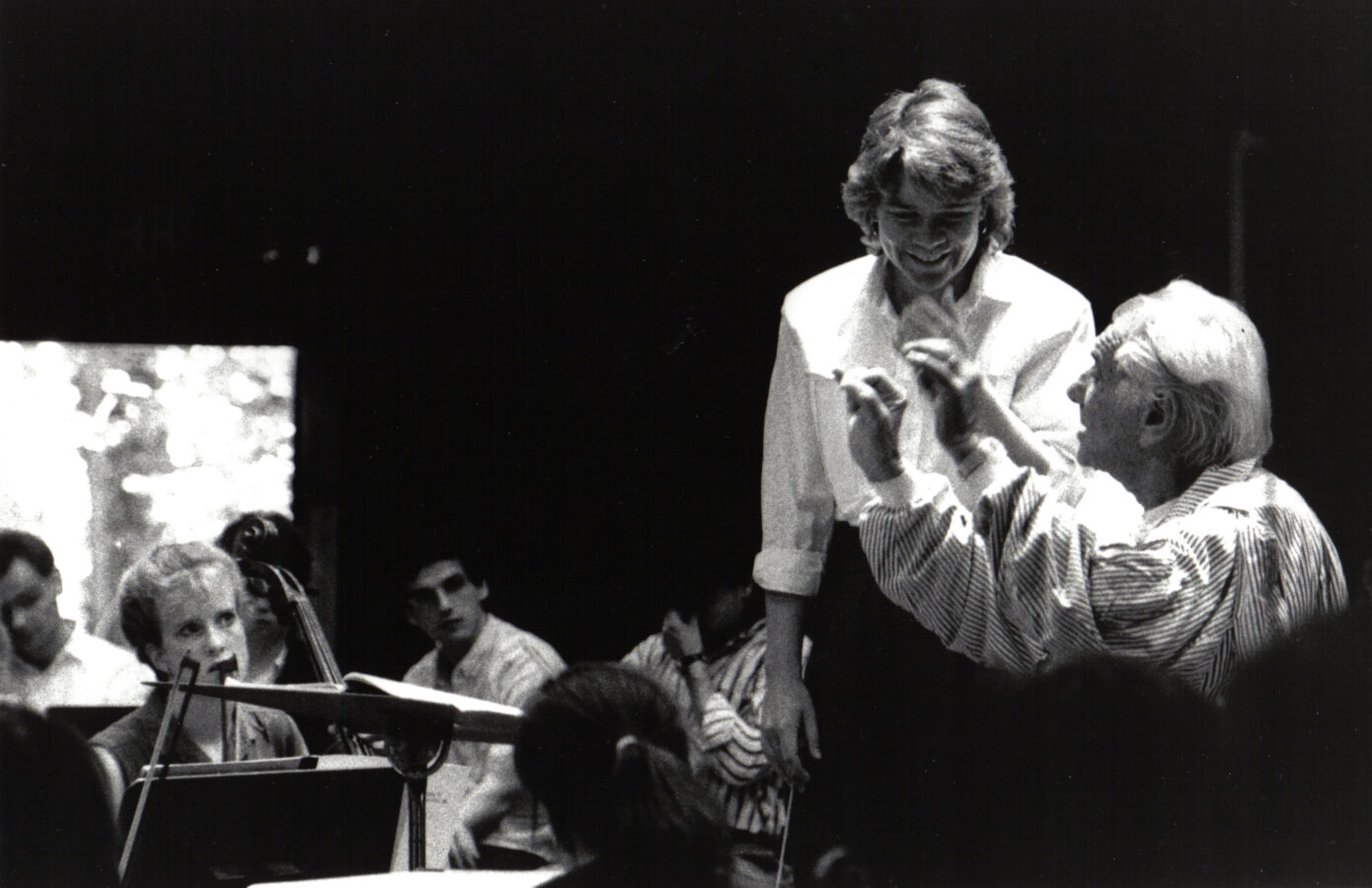
Marin Alsop with her mentor, Leonard Bernstein (Photo: Walter Scott)
Alsop’s mentor was the iconic American conductor/composer/pianist Leonard Bernstein. Contemplating his leadership, she remembers that Bernstein was “so focused on giving me the tools I needed to conduct the piece… that I don’t even remember the room… He was completely present and exceeded all of my expectations…” She expands, “It wasn’t that he was helpful in my career. Not at all. He just was helpful about validating me as an artist.”
Kelly recalls that she never had a mentor who was a director. But she names an English architect, Cedric Price, as one of her most valued guides. Echoing Alsop’s experience, Kelly says that Price “reflected back to me that I was somebody that I could believe in… It’s not telling someone what to do, it’s sharing something you’ve discovered. ‘Here’s one key to unlock a door. If it works for you, use it.’”
Looking Forward
Tomorrow’s artists and leaders face a dizzying number of challenges.
And when fighting against the status quo, both Kelly and Alsop have one simple piece of advice, which pertains especially to women: try not to worry so much about being liked. “I think that took a lot of my energy,” considers Kelly, before Alsop joins in to add in unison: “they’re not going to like you anyway!” Alsop completes the thought: “I came to the place that, for me, it’s much more important to be respected.”
Another bit of wisdom from Price has guided Kelly, too. “He said, ‘Always build towards the light.’ That is an architectural idea but also a wonderful metaphor… Always travel towards something that has got hope inside.”
Continuing to build towards the light remains a core credo of both artists’ busy working lives.
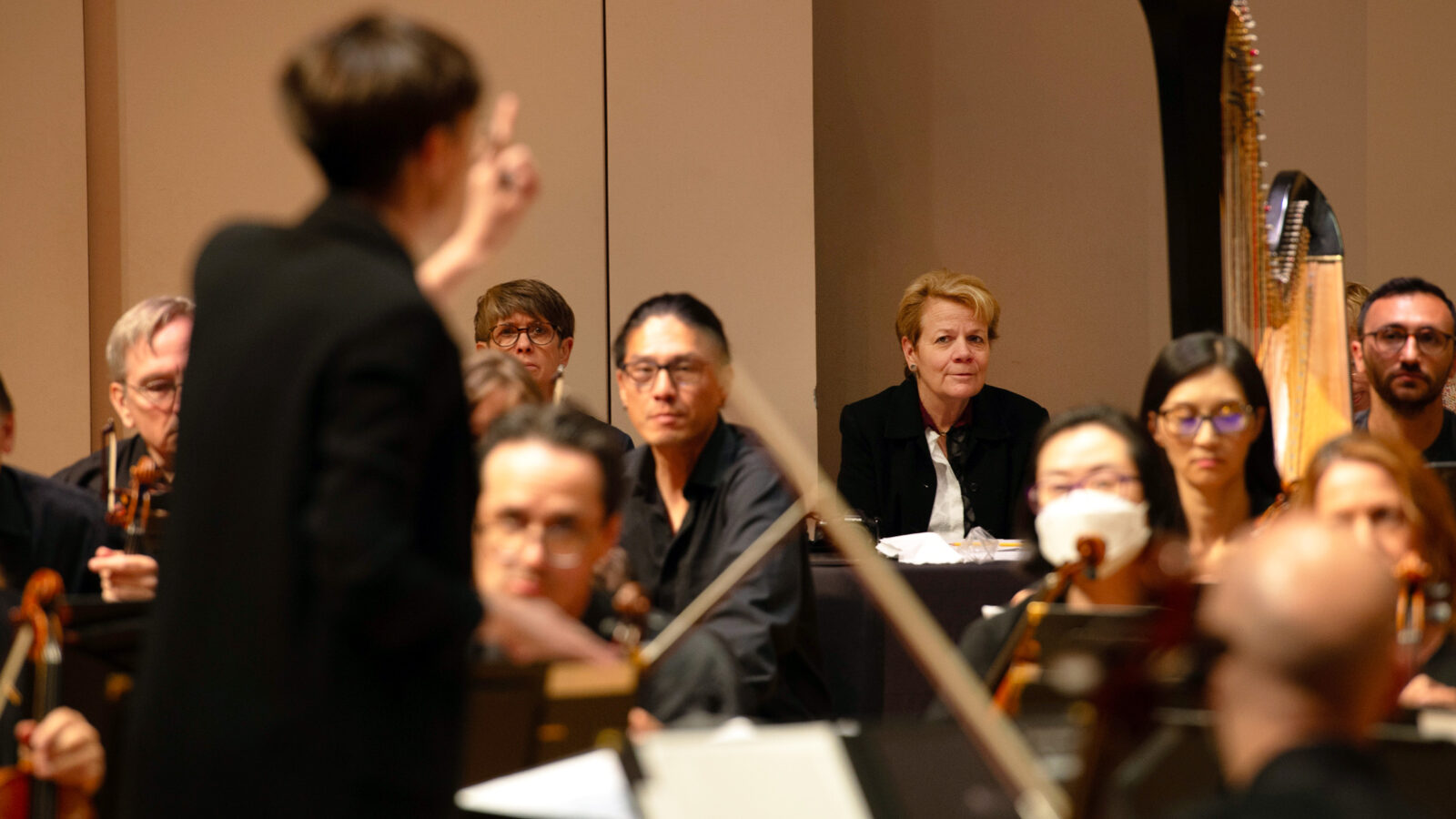
Marin Alsop oversees a collaborative workshop as part of the Breaking Barriers Festival (Photo: Patrick Gipson)
Alsop opened the CSO’s 2023 Ravinia Summer Residency with a reworked take on Beethoven’s enduringly hopeful Ninth Symphony. And she is soon headed to South Africa to perform with an upstart orchestra made entirely of South African musicians. “There is a desire in the country to create an opportunity for young artists… I think I can build some bridges for them. That makes me feel engaged, not only as an artist, but also on a human level.”
Kelly, meanwhile, is writing a book, something that she is announcing frequently to ensure that she does, indeed, put pen to paper. And just the day before the panel, she shares, she had an idea for an opera, which would be her first.
The duo is committed to working together again, too. When asked if they have a dream project to collaborate on, Kelly responds wryly, “We do. We don’t know what it is yet, though…”
Ravinia Festival’s 2023 Breaking Barriers Festival took place from July 21-23, 2023. For information about Ravinia’s season, visit ravinia.org. This discussion has been edited for space and clarity.

